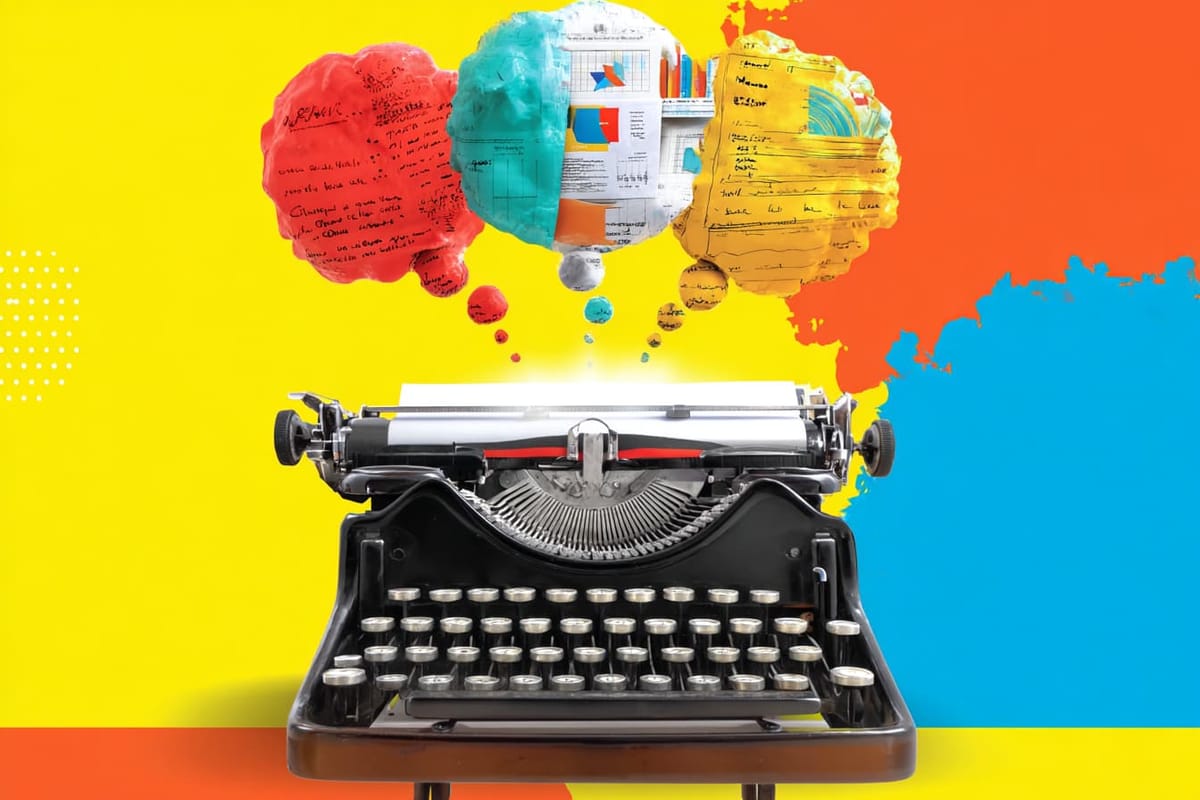What AI Can’t Replicate: Your Voice and Your Insights
How AI can support creative work — not replace it.

AI lets people generate content at a dizzying speed. I've seen websites with hundreds of barfed-out AI-generated articles. LinkedIn comments that literally say nothing because someone thought "quantity over quality" and used an AI tool. Cold emails that are written by a robot and not a human.
AI-generated content is always going to be generic because it's a regurgitation of everything else on The Internet. It's not original thought.
For writers, creatives, or anyone else building online, your authentic voice and your opinion are the differentiators. So how does AI fit into the content creation process?
You can use AI for speed. I use AI for speed. Many parts of content production are slow and tedious. But everything I published has been edited to reflect me.
Here's why AI is a complement to, not a replacement for, creative work.
You provide judgment
I once heard someone say, "Generative AI lacks taste." And that pretty much sums it up.
Generative AI can give you 1,000 ideas in a minute. But it can't tell you if any of those ideas are good. You can ask ChatGPT to give you five title ideas for something you're writing. But you still have to choose the best one.
People who publish "AI slop" are asking ChatGPT for one idea and then just publishing it. That's absolutely the wrong way to go about it.
I'll use ChatGPT to give me four LinkedIn posts based on a blog post. But absolutely nothing gets published without review and editing. No matter how good generative AI gets at predicting my voice, it's never quite the same way I would phrase something. It lacks the nuance I would add or the angle I would take.
AI gives you speed and volume. Your judgment comes from experience. And that can't be automated.

You go beyond summarization
Generative AI is really good at summarizing articles, meeting notes, or transcripts — anything that would take a lot of time to review manually. But the summary is not the final step. It's only the starting point.
You still have to interpret, question, and connect the dots. Why is this information interesting? Why does it matter? Why will someone else care?
AI has incredible recall, in a way that humans don't. It can skim through an unlimited amount of data, which is really helpful for research and summarization.
The other day, I had a meeting with a potential client. My AI notetaker (Fireflies) joined the meeting. It created a transcript and a summary of follow-up items from the meeting. One of the follow-up items was to send the client a proposal.
The summary was helpful, so I could remember the task I needed to do. But I still had to draft a personalized, friendly email to the prospective client. I had to select examples of my work to help her connect the dots between what she needs and my skillset.
An AI-generated summary is just that: a summary. You provide the context.
You break out of patterns
AI’s strength is prediction. Our lives are filled with familiar structures and patterns and AI follows those.
Your advantage is that you see the exceptions. You notice when something doesn't follow the pattern. You know when to pivot, challenge assumptions, or take a contrarian stance.
You bring lived experience and intuition into the process, which is impossible for AI.
There's a reason people have been able to identify generative AI because it has certain "tells." It uses repetitive words and patterns. (For all frequent uses of the em dash — myself included — I'm sorry. AI gave the em dash a bad rap.)
I can tell when someone sends me a cold email using generative AI. Often they're personalized in some way (from scraping the internet), but they sound "off." The emails are following a predictable pattern for cold emails, but they lack the qualities of real human interactions.
You build meaning
AI can generate words, but it can’t create meaning.
When I write, I include examples and stories from my life. I include my opinions and frustrations. I'm endlessly curious. All of these things shape what I publish online.
If you follow Google's E-E-A-T guidelines for creating people-first content, your writing needs to demonstrate experience, expertise, authoritativeness, and trustworthiness. Those come from your background and your perspective. Generative AI — on its own — lacks that.
Generative AI has no way of knowing that I was a guest on the Wisepreneurs podcast. On that podcast, I talked about maintaining my authentic writing voice in a world of AI. That conversation sparked the idea for this article.
Did I use ChatGPT to help me build out an outline for this article? Yes. Do I use automation in my blog publishing process? Yes. Did ChatGPT include any personal experiences or my unique perspective? No. I had to decide what to include and how to incorporate those pieces into my full draft.
Your voice, your experiences, and your point of view can never be replicated.

The advantage of collecting ideas
I've been an intense data collector for years. Notes, screenshots, quotes, highlights. I'd often go back and review these things later, but it was a laborious, manual process. If I wanted to quote something from an article, I'd have to go back and find it again.
Generative AI has been a game-changer for people like me. My search results are less dependent on my memory, or adding the right tags or categories to my notes.
If you're a writer who collects ideas, you have a huge advantage. You have a personal dataset that no one else has. And AI is now the tool to help you put that dataset to use in ways that weren't previously possible.
On his podcast Wisepreneurs, host Nigel Rawlins shared:
I am going to turn 70 next year. I am probably writing more than I've ever written in my life. I saw a quote somewhere that, for seniors, AI can accelerate what they already know how to do.
My gut feeling is that older professionals have an advantage because they haven't always been digital. They've actually read books and can still read documents. Provided the older professional is still reading and looking at notes and thinking, I think AI actually gives them an edge.
What Nigel said about seniors is true for any person who collects ideas and information.
AI won't replace human writers
A lot of writers are understandably concerned about generative AI. Will it replace their jobs?
Generative AI, on its own, is not content that anyone wants to read. People will scroll past it in their feeds or click away from a generic blog post.
If a client replaces a human writer with generative AI, the client likely did not care much about quality in the first place (unfortunately).
But writers would be remiss not to use AI to their advantage, since it can speed up so many parts of the writing process. Research, content repurposing, outlining — all easier with generative AI.
I've always been a person who uses any tool that makes my work more efficient. That's why I'm not fighting AI. I'm figuring out how to incorporate it without losing my uniquely human perspective and voice.
Check out my free eCourse and
learn how to find content inspiration in everyday life.








